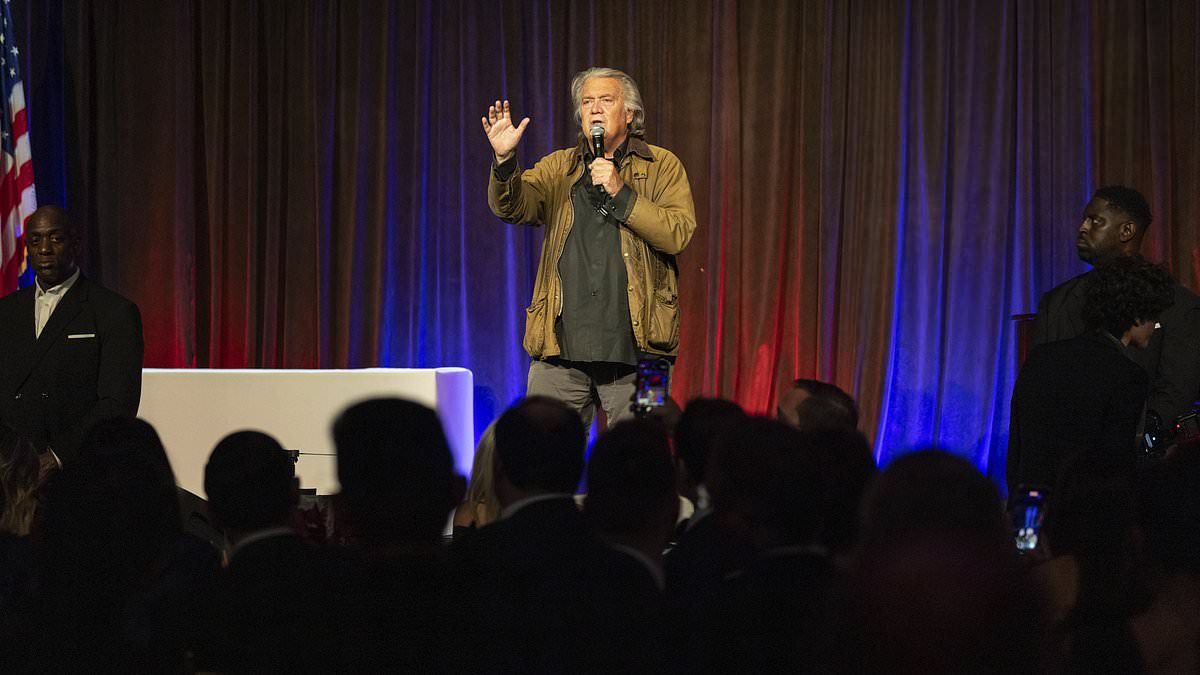Longtime Donald Trump advisor Steve Bannon touted a legal theory that could allow Donald Trump to defy the 22nd Amendment to the Constitution and try to remain in office even after the completion of his second term.
Bannon, who was spotted at Mar-a-Lago with Trump early this month, promoted the idea in a speed at the New York Young Republicans Club.
‘Donald John Trump is going to raise his hand on the King James Bible and take the oath of office – his third victory and his second term,’ Bannon told the crowd at a weekend gala.
Then he floated a legal theory that argues that the 22nd Amendment – ratified in 1951 after Franklin Roosevelt was elected to his fourth term and – would not prohibit such a move so long as the terms weren’t ‘consecutive.’
‘And the viceroy Mike Davis tells me, since it doesn’t actually say “consecutive,” that, I don’t know, maybe we do it again in ’28? Are you guys down for that? Trump ’28? Come on man!’
Bannon’s idea drew a roar of approval from the crowd who gathered for the event.
His comment that it was Trump’s ‘third victory’ also suggests that he won in 2020, although he lost to Joe Biden by about 7 million votes.
It was among the most elaborate descriptions of a third-term scenario by a Trump insider – although it is far from the only time it has come up.
Bannon served as chief White House strategist in Trump’s first term. He made jokes at the event about his recent release from federal prison in Danbury, Connecticut for failing to comply with a congressional subpoena.
Trump, 78, the oldest person to be elected president, himself has repeatedly toyed with the idea in public comments.
Days after the election, Trump joked about running for a third term – rejecting the idea even as he floated it.
‘I suspect I won’t be running again, unless you do something,’ Trump he told House Republicans, according to pool reports and audio.
‘Unless you say, “He’s so good, we have to just figure it out.”‘
There is a mechanism for removing the constitutional two-term limit, but it must meet a high bar – approval by a supermajority in Congress and ratification by three-quarters of the states.
Trump spoke against the idea to Time magazine in April, saying he was against a ‘challenge’ to it.
‘I wouldn’t be in favor of a challenge. Not for me. I wouldn’t be in favor of it at all. I intend to serve four years and do a great job. And I want to bring our country back. I want to put it back on the right track.’
Bannon’s comments came after Democrats and Trump critics spent much of the campaign saying he had authoritarian impulses.
His remarks were immediately shared on social media by Republicans Against Trump, as well as Trump allies.
The 22nd Amendment states: ‘No person shall be elected to the office of the President more than twice, and no person who has held the office of President, or acted as President, for more than two years of a term to which some other person was elected President shall be elected to the office of the President more than once.’
The second clause applies to someone who might assume the presidency partway through a term, who could therefore serve for more than eight years.
‘I don’t think there’s any realistic possibility that the 22nd Amendment could be repealed,’ U-Penn law professor Kermit Roosevelt told FactCheck.org in November.
‘That would take another amendment (like the 21st, repealing the 18th) and I don’t think it would get 2/3 of both houses of congress, much less 3/4 of the states, the great-great-grandson of President Theodore Roosevelt said.
Although the language on no person being ‘elected’ more than twice appears quite clear, a CRS report explored the possibility that someone could rise to the presidency through succession.
But that would not appear to include running for and winning election to a third term.
